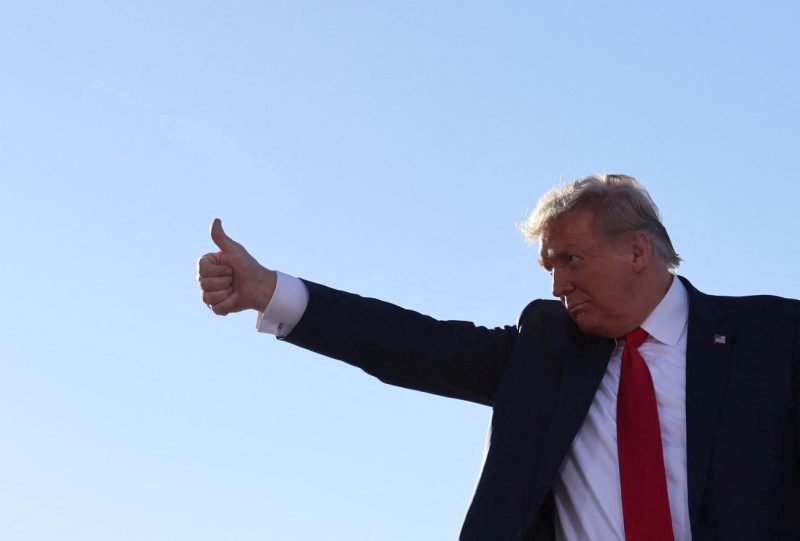It’s very easy to see how NFTs — non-fungible tokens; bits of digital art created to be unique — would appeal to Donald Trump. People were paying hundreds of thousands of dollars for exclusive ownership of a drawing of a monkey! All you had to do was make a picture, hit some internet buttons somewhere, and suddenly you’re vacuuming up cash like there’s no tomorrow. For Donald Trump, a guy who used his name to sell everything from steaks to water, the idea would be irresistible.
So, on Thursday, the former president of the United States — a guy who two years ago oversaw the vast power of the American government, a man who at one time could command armies and navies as he saw fit — announced that he was getting into the NFT game.
There are … just a few problems.
The first is that those NFT creators weren’t vacuuming up cash but crypto — that is, digital currency that is only loosely tethered to the actual economy. A lot of those hundreds-of-thousands-of-dollars sales were in currencies that have since lost a lot of value, making them, say, thousands-of-dollars sales.
The second is that people were paying lots of money for NFTs. Crypto went through a boom in 2021 that helped power the NFT market. By January, there were more than 322,000 sales of collectible NFTs a week, generating hundreds of millions of dollars. But by September, trading volume had collapsed by 97 percent. In the most recent week, according to NonFungible, there were only about 33,000 sales of collectible NFTs.
This is in part because crypto itself has been hammered. It is also, in part, because the NFT fad has deflated. NFTs were hyped as a big innovation in art and collecting — but it quickly became apparent that “ownership” didn’t mean much, given how images could be shared, and that fraud was rampant. CNN figured it would jump into NFTs … and then quickly jumped back out. And that was two months ago!
The third problem with Trump’s effort is that the entire thing is far more Trump Steak than Trump 2016. For all of his obsession with presenting a glamorous lifestyle, his aesthetic has long been more Queen of Versailles than Versailles. And the art in the NFT line largely consists of clumsily Photoshopping Trump’s head onto manly, svelte figures — not necessarily the sort of thing that someone might find worth an initial $99 investment.
To be fair, the initial pitch from Trump doesn’t dwell much on the potential for that investment to increase over time, one of the reasons people got excited about NFTs in the first place. Instead, the initial pitch presented at CollectTrumpCards.com comes off more like you’re being asked to buy a pack of baseball cards. After all, included in every sale is the chance to win an amazing prize, from dinner with Trump — “I don’t know if that’s an amazing prize,” Trump says in a video promoting the sales, “but it’s what we have” — to one hour of golf with him to personal Zoom calls.
The promotional video is very Trump. He begins, for example, by speculating that he is probably the viewer’s favorite president of all-time, more than Washington, more than Lincoln. It’s a weird reminder that he was president, offering a jarring contrast with the sales pitch that follows. This is what our favorite president is doing? Trying to get people to pony up $99 for a picture of Trump dressed as a NASCAR driver for some reason?
A picture, mind you, that you “own” only conceptually. It’s a bit like those kiosks at the mall where you could buy pictures of Jesus doing different jobs, letting you, say, get a mug of Jesus helping a school-bus driver to give to your friend who drives a school bus. But at least then you got the mug.
When Donald Trump lost the 2020 election, he found a way to generate a ton of money despite losing power. Through incessant email appeals, he managed to scoop up tens of millions of dollars from supporters who believed they were helping him fight to retain his position. Now, it seems, he’s trying a new angle. He probably feels empowered by the success of his coffee-table book of pictures from his presidency. If people are paying $75 for that book (or more than $200 if signed!), why wouldn’t they pay $99 for these? One reason, of course, is that with the book, you at least get the book.
(I really cannot stress enough how bad the Photoshopping is here.)
What’s really remarkable about this is that Trump is theoretically a candidate for the presidency. His campaign, announced last month, has not really done much yet, to the frustration of his allies. But here he is, spending time hyping a product unrelated to the campaign, one that lines his own pockets. (As has often been the case with Trump’s business ventures, he’s licensing his name to the company offering the NFTs.) He is tapping into his supporters’ limited pool of good will and money in order to benefit himself, not his purported presidential campaign.
I got out of the Trump-prediction-making game back on Nov. 8, 2016, so I will make no predictions about whether Trump’s NFT play will work. I will note, however, that Melania Trump tried to make waves with NFTs a lot closer to the market’s peak — and wound up buying her own offering.
But, then, it wasn’t a really cool picture of her dressed like a football player, standing at the “45” yard line. That plus the chance to be part of a “group Zoom call” with Trump? As Trump says in the video, the $99 cost “doesn’t sound like very much for what you’re getting’!
The one-time proprietor of Trump University certainly wouldn’t steer you wrong.

